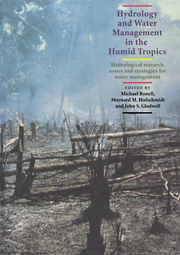 Hydrology and Water Management in the Humid Tropics
Hydrology and Water Management in the Humid Tropics Book contents
- Frontmatter
- Contents
- List of Authors
- Foreword by Federico Mayor, Director-General, UNESCO
- Preface
- Cartographic Credit
- Acknowledgements
- SECTION I INTRODUCTION
- SECTION II HUMID TROPICS SETTING
- SECTION III REGIONAL HYDROLOGY
- SECTION IV PHYSICAL PROCESSES
- SECTION V PHYSICAL PROCESSES – HUMAN USES: THE INTERFACE
- 17 Challenges in Agriculture and Forest Hydrology in the Humid Tropics
- 18 The Impact of Land-Use Change on Water Resources in the Tropics: An Australian View of the Scientific Issues
- 19 Urban Water Management Problems in the Humid Tropics: Some Technical and Non-Technical Considerations
- 20 The Management of Water Resources, Development and Human Health in the Humid Tropics
- 21 Water Supply and Health in the Humid Tropics with Particular Reference to Rural Areas
- SECTION VI MANAGEMENT ISSUES
- SECTION VII APPENDICES
- Place index
21 - Water Supply and Health in the Humid Tropics with Particular Reference to Rural Areas
Published online by Cambridge University Press: 23 December 2009
- Frontmatter
- Contents
- List of Authors
- Foreword by Federico Mayor, Director-General, UNESCO
- Preface
- Cartographic Credit
- Acknowledgements
- SECTION I INTRODUCTION
- SECTION II HUMID TROPICS SETTING
- SECTION III REGIONAL HYDROLOGY
- SECTION IV PHYSICAL PROCESSES
- SECTION V PHYSICAL PROCESSES – HUMAN USES: THE INTERFACE
- 17 Challenges in Agriculture and Forest Hydrology in the Humid Tropics
- 18 The Impact of Land-Use Change on Water Resources in the Tropics: An Australian View of the Scientific Issues
- 19 Urban Water Management Problems in the Humid Tropics: Some Technical and Non-Technical Considerations
- 20 The Management of Water Resources, Development and Human Health in the Humid Tropics
- 21 Water Supply and Health in the Humid Tropics with Particular Reference to Rural Areas
- SECTION VI MANAGEMENT ISSUES
- SECTION VII APPENDICES
- Place index
Summary
ABSTRACT
This paper addresses the issues related to water supply and health in rural areas. Consideration will be first given to various means of interrupting the transmission cycle of waterborne and water-washed diseases. Such interventions can contribute significantly to improved health in the developing world. Finally, the trends, strategies and philosophy for the future management of rural water supplies are considered, with the emphasis on low-cost and appropriate technologies. Particular emphasis will be directed towards groundwater as the primary water resource.
INTRODUCTION
This paper concentrates largely on rural water supplies and sanitation as they relate to health in the humid tropics. By interrupting the transmission cycle of water-borne and water-washed diseases, these interventions can contribute significantly to improved health in the developing world. The issues, trends, strategies and philosophy for the future are explored, with the accent on low-cost and appropriate technologies. Particular emphasis is given to groundwater as the primary water resource.
The history of the human race is dominated by its quest for a safe water supply. Wars have been fought and massive migrations have taken place to gain and to guarantee access to safe water. Archaeology has revealed the monumental aqueducts, sewerage disposal systems, dams and other costly irrigation projects of the ancient civilizations which attest to the fact that the availability of water and the disposal of waste have always been among the principal societal concerns. It was taken for granted that a safe and ample water supply and adequate sanitation facilities were a condition sine qua non for healthy and happy living.
- Type
- Chapter
- Information
- Hydrology and Water Management in the Humid TropicsHydrological Research Issues and Strategies for Water Management, pp. 454 - 468Publisher: Cambridge University PressPrint publication year: 1993
